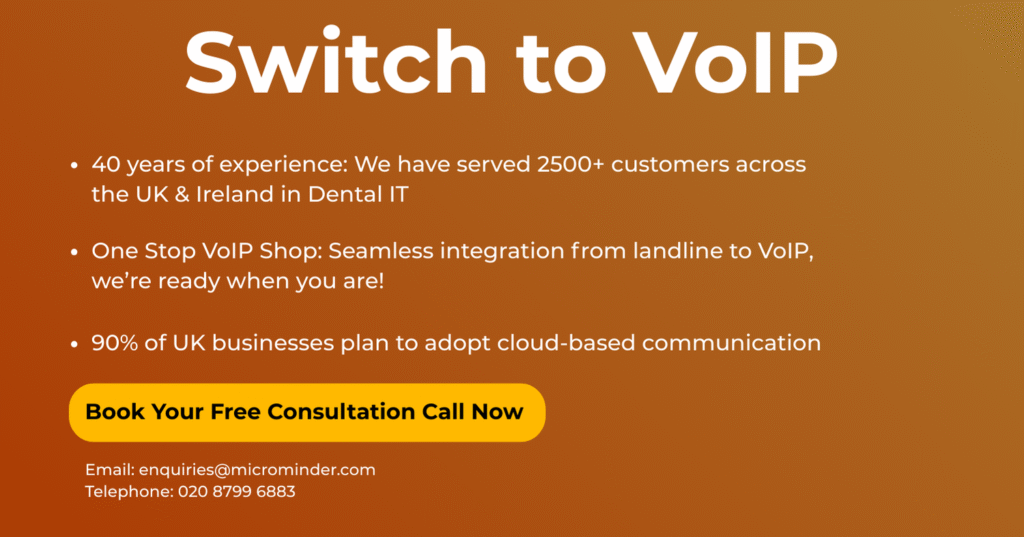VoIP phone systems are transforming how Dental practices communicate. They use the internet to transmit voice calls, offering a more flexible and cost-effective alternative to traditional landlines. According to a recent survey, 90% of UK businesses plan to adopt cloud-based communication, with VoIP being a key technology. VoIP processes vast amounts of data to provide a seamless call experience, offering significant savings of up to 60% on call costs for small to medium-sized businesses.
A VoIP phone system uses your broadband internet connection to send and receive calls. Instead of a traditional copper wire connection, voice signals are converted into digital data packets and sent over the internet. This technology is a core component of modern Dental IT infrastructure, enabling a unified communication system for practices of all sizes.
The system relies on a strong internet connection. Calls can be made and received using a dedicated VoIP phone, a computer with a headset, or even a smartphone app. This flexibility allows staff to work from anywhere, which is particularly beneficial for remote support and out-of-hours service.
VoIP systems help dental practices improve communication efficiency and patient experience through several key features. The technology allows for easy integration with practice management software, automatically linking patient records to incoming calls. This reduces administrative time and ensures staff have all necessary information at their fingertips.
Features like virtual receptionists can route calls to the correct department, ensuring appointments are handled efficiently. VoIP phone systems also provide detailed call analytics, allowing practices to track call volumes, peak times, and staff performance. This data helps optimise staffing levels and improve patient service. Call forwarding to mobile devices ensures that emergency calls are never missed, a critical aspect of patient care and satisfaction.
VoIP is safe guarded when implemented with proper security protocols and strong cybersecurity. Because VoIP systems operate over the internet, they are subject to the same cyber threats as other network devices, including phishing, malware, and denial-of-service attacks. However, Microminder offers robust cybersecurity solutions to protect your data.
Proper security measures include using strong passwords, enabling two-factor authentication, and regularly updating the system’s software. Encryption is a fundamental security feature in VoIP, ensuring that all voice data is scrambled and unreadable to unauthorised parties. The use of a VPN can add an extra layer of protection, especially for staff working remotely, as they often connect from home networks, public Wi-Fi, or mobile hotspots, all of which are less secure than the clinic’s internal network. Regular penetration testing and vulnerability assessments are also recommended to identify and fix potential security weaknesses.
Patient Marketing
VoIP systems allow your practice to market any specials or specific closing times to patients while they are in the que. This will enhance your opportunity to gain awareness about your services, specials and festive closing times.
Internal Collaboration
VoIP enhances communication between staff, allowing for seamless transfers between the front desk, hygienists, and dentists. Features like emails facilitate quick consultations and team meetings, which is crucial for a busy practice.
Cost Reduction
Moving to a VoIP system can significantly reduce monthly phone bills. Since calls are made over the internet, long-distance calls are often much cheaper. The system also eliminates the need for expensive traditional phone hardware and maintenance.
Call Recording: Essential for training staff and resolving patient disputes.
Auto-Attendant: An automated menu that directs calls to the right person or department, improving patient service.
CRM Integration: Links your phone system with patient management software, providing instant access to patient records.
Call Forwarding: Routes calls to mobile phones, ensuring urgent calls are handled even when the practice is closed.
Call Analytics: Provides insights into call volume, duration, and staff performance to optimise operations.
The future of Dental IT and VoIP lies in smarter, more connected systems that streamline patient care and practice operations. AI-driven call analytics will help predict patient needs, optimise appointment scheduling, and personalise communication. Mobile apps will give staff greater flexibility to manage calls, messages, and patient records on the go. As VoIP platforms become more integrated with practice management software, clinics will benefit from real-time collaboration, automated reminders, and secure data handling. With rising cybersecurity threats, Microminder is committed to advancing threat detection and protection across communication channels, ensuring patient trust and regulatory compliance remain at the core.

Yes — but only if your internet connection is strong and stable. VoIP relies on bandwidth, so practices with multiple consultations and admin tasks need a robust setup to avoid call drops or poor audio quality. Dental IT providers such as Microminder help optimise networks to reduce latency and jitter, ensuring smooth conversations
Definitely. VoIP eliminates line rental and long-distance call charges. Plus, with BT’s PSTN switch-off looming in 2027, VoIP future-proofs your practice while saving on maintenance and setup costs
Yes — and that’s one of its biggest advantages. VoIP systems can sync with dental management platforms to streamline appointment booking, enable voicemail-to-email, video calling and support call forwarding during peak times. This ensures no patient call goes unanswered, which is crucial for patient care and boosting satisfaction